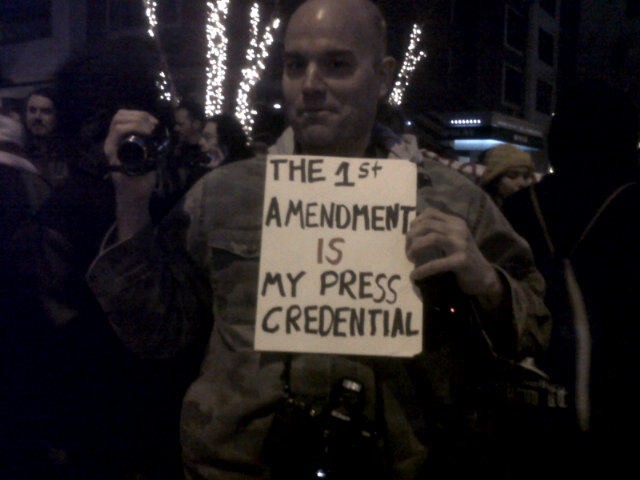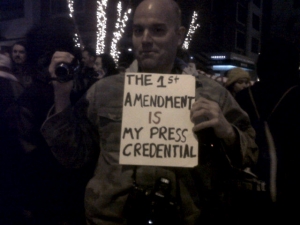
Citizen Journalist Arrests on the Rise at Occupy Protests
Late last Friday journalists and protesters gathered outside the home of New York City Mayor Michael Bloomberg to speak out in defense of the First Amendment. The event drew more police than participants, which only reinforced the message the group hoped to send regarding the NYPD’s heavy-handed approach to journalists covering Occupy Wall Street.

Police are increasingly targeting citizen journalists and livestreaming groups.
Last fall in New York and Los Angeles, when the respective cities and police departments internally coordinated efforts to block and suppress press coverage of raids on Occupy encampments, the bulk of the video and images coming out of those events was from citizen journalists and livestreamers. At the time, there was a lot of talk about whether police were intentionally targeting journalists. In light of many of the firsthand accounts from journalists who were arrested and harassed, it appeared so. Ironically, while police arrested and roughed up journalists with credentials and professional equipment, those with cellphone cameras and laptops often passed in and out of police lines documenting the raids.
These citizen journalists — some of whom streamed live for days on end without a break — have been held up as vital news sources, and are symbolic of a new era of journalism in the midst of protest. Their work has been given a national spotlight, with profiles in Time, features in major newspapers and their feeds embedded around the Web. The work of people like Tim Pool, Globalrevolution.TV, Los Angeles’ Spencer Mills (aka OakFoSho) and innumerable Occupy media teams has become one of the key stories of the Occupy movement.
On Friday it was many of those citizen journalists who spoke out against the incursions on freedom of the press. That is not surprising, given recent events.
As the public outcry over journalist arrests has heightened, and press associations have kept the pressure on local police departments, it seems there has been a shift in focus. Increasingly, it appears that police are targeting these loosely organized citizen journalists and livestreaming groups. I recognize that one has to be careful in suggesting, without documented evidence, that there is an intentional effort to target journalists. However, recent events are painting a picture that is hard to ignore.
On Dec. 12, Occupy protesters gathered in New York’s World Financial Center. The protest sparked a wave of arrests, and more than half of those arrested were citizen journalists who were primarily photographing, livestreaming or otherwise covering the event. Those on the scene suggested that police looked for people holding cameras and went after them. Videos like this one and this one back up that assertion. This was also the protest in which police actively blocked a New York Times photographer and eventually dragged him from the building.
Then, at the start of the new year, the NYPD shut down the Globalrevolution.TV studios and arrested members of the livestreaming group. On Jan. 2, an eviction notice claiming building-safety concerns was delivered to the group, although no other tenants in the building received this notice. The next day, after the group experienced repeated run-ins with the landlord, police arrived and arrested six members of the video collective. They were released after spending about 30 hours in custody, but remain locked out of their studio, where many of them were living.
Finally, on Jan. 4, members of the Occupy Oakland media and livestreaming team were arrested. In a raid that coincided with the city revoking Occupy Oakland’s permit for the use of Oscar Grant Plaza, 11 protesters were arrested. Two were members of the Occupy Oakland media team. This video makes it clear that one of those people, Adam Katz, was filming and trying to obey police orders when he was arrested. You can see his video here.
Just as these arrests of livestreamers and citizen journalists were starting in December, the Committee to Protect Journalists released its 2011 census of journalist detainments worldwide. In its report CPJ found that “the number of journalists imprisoned worldwide shot up more than 20 percent to its highest level since the mid-1990s.” Of the 179 journalists imprisoned worldwide, 86 were digital journalists whose work appeared primarily online and 78 were freelancers. The demographics of journalism are changing: We have more freelancers and citizen journalists covering critical events and issues.
Including these citizen journalists and livestream producers, 50 people have been arrested while reporting on Occupy Wall Street around the country. “The police should stop arresting journalists, but they're not necessarily going to do that,” said John Knefel, one of the journalists who spoke at the rally. “We need to stop being afraid of being arrested."
While I agree with this sentiment, our solution can’t simply be to tell journalists not to worry about arrests. We have to demand more from our mayors, our police forces and our lawmakers, and we should each take responsibility for our own role in protecting the First Amendment, and safeguarding the rights it grants us.
Photo credit: Courtesy of yfrog.com